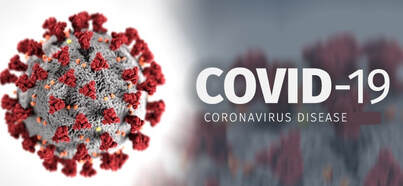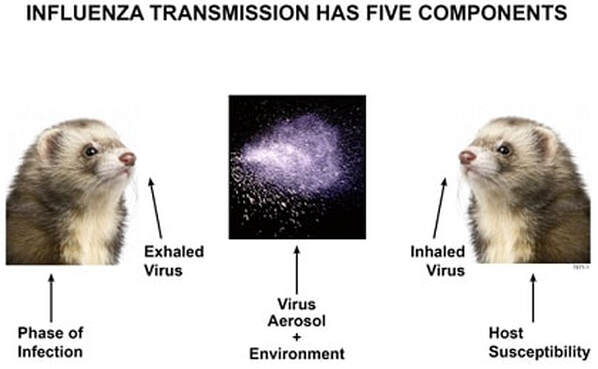|
Can COVID-19 infect ferrets? This is a key question. Coronaviruses are a group of related viruses that cause disease in humans and animals. The name comes from the Latin word "corona" - or "crown"-- due to the crown-like projections from the viral surface. Coronaviruses have been found in both domestic and wild species—including cattle, horses, dogs, cats, camels, bats, civets, domestic ferrets, birds, and more recently, in snakes. At least three groups of coronaviruses cause mild to severe gastrointestinal (GI), lung, or systemic disease. Coronavirus infections are responsible for some cases of the common "cold"; others can be lethal, such as SARS (Severe Acute Respiratory Syndrome), MERS (Middle Eastern Respiratory Syndrome), and COVID-19. Ferrets and Coronaviruses Ferrets are no strangers to coronaviruses. In 1993, a novel serious and highly contagious diarrhea spread through domestic ferrets in the United States. Known as the “Green Slime” from the appearance of the diarrhea, the disease became formally recognized as Epizootic Catarrhal Enteritis (ECE). ECE spread rapidly among ferrets. ECE did not infect humans. In 2002 people around the globe experienced the SARS (SARS-CoV), which resulted in serious lung infections. Ferrets were found to be susceptible to SARS. However, ferrets were not found to be susceptible to MERS (MERS-CoV), another serious human respiratory virus that appeared a decade later. COVID-19 Viruses generally spread following contact with an infected person or animal. Concern has been raised regarding the potential spread of COVID-19 from animals to humans: “zoonotic” transmission. Although zoonotic spread of viruses is not a common way for humans to become infected, transmission from animals to humans has been documented with SARS from wild civet cats. Other viruses besides coronaviruses may also spread from animals to humans, such as the H1NI influenza virus, found in pigs--"Swine flu", and in birds--- "Avian flu". When COVID-19, officially "SARS-CoV-2", first appeared in China in late 2019, it was thought to have originated from bats, and then transmitted to humans through an intermediate animal host. Studies are still ongoing at this time to explore the origin of the COVID-19 outbreak. At this time it is not known if ferrets can become infected with COVID-19. Animal Models for Vaccine and Drug Testing Domestic ferrets (Mustela putorius furo) have been recognized since the 1980's to be susceptible to the "seasonal flu" virus. The ferret can both catch and transmit the influenza virus in a manner very similar to how the virus acts in humans, as shown in the following figure. The close similarity between how the virus acts in humans and ferrets makes the ferret an excellent laboratory model to test antiviral drugs and vaccines. The ferret has been the animal of choice to study a variety of respiratory viruses, which have included human and avian influenza viruses, coronavirus, nipah virus, morbillivirus, amongst others. [Belser 2011] It is not known if the ferret can become infected with COVID-19.
According to the United States Centers for Disease Control and Prevention (CDC), COVID-19 is thought to spread mainly from person-to-person. At this time, there is no evidence that companion animals, including pets, can spread COVID-19. [AVMA,CDC, OIE] Transmission occurs between people in close contact with one another (less than 6 feet apart). The virus is carried on tiny droplets sprayed when an infected person speaks, coughs, or sneezes. It may also remain on surfaces where the infectious droplets land. Touching surfaces infected by the virus and then touching your mouth, nose or eyes, or food you eat can introduce the virus into your body. Common Sense Rules If you or a family member develop signs or symptoms—fever, cough, trouble breathing--and are found to test positive for COVID-19, follow these guidelines:
If you cannot delegate the care of your animals,
As a matter of routine care, it is always a good idea to wash your hands with soap and water BEFORE and AFTER contact with pets to help avoid transmission of more common illness-causing agents. Selected References
Comments are closed.
|
Details
Archives
April 2024
Categories
All
|
|
Terms and Conditions
|
allFerrets® 2014-2024. ALL RIGHTS RESERVED.
Proudly designed by widgIT |



 RSS Feed
RSS Feed
